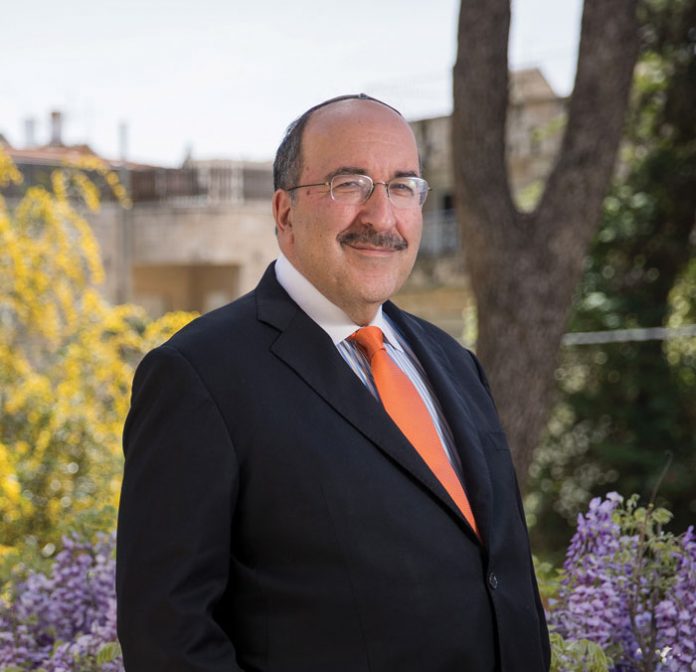Before there was a Jared Kushner, David Friedman or Jason Greenblatt—that is, Orthodox Jewish diplomats and peacemakers—there was Dr. Dore Gold, a man who was never shy about his religious affiliation, proudly wearing a yarmulke even while serving as Israel’s ambassador to the United Nations.
I point this out to him on a recent visit to his office, located in a charming building on a quiet street in the Katamon neighborhood of Jerusalem. The historic building, which served as the Uruguayan Embassy to Israel from 1957 to 1980, is presently owned and occupied by the Jerusalem Center for Public Affairs, which Dr. Gold has headed for the past 20 years except for a short leave of absence, during which he was director-general of the Israeli Ministry of Foreign Affairs. It is said that Sheldon Adelson—the American billionaire casino magnate who is an avid supporter of the Republican Party and the Israeli Likud Party—is one of the main financial supporters of the JCPA. Judging by the center’s conservative, or neo-conservative, leanings, it makes sense. And when you consider that Dr. Dore Gold is an on-again, off-again foreign policy adviser to Prime Minister Benjamin Netanyahu, it is even more logical. But funding issues and political leanings aside, when I tell my gracious host that his yarmulke has always made me feel proud, he responds good-naturedly that being religious is actually an advantage in that neck of the woods.
“Religious Muslims get along better with frum Jews than they do with Jews who aren’t religious,” he tells me. “A few years ago, I was asked to travel to Qatar—which my mother might have pronounced as ‘kvatter’—where I had to meet with the emir in a tent. It happened to be during the month of Ramadan, when the Muslims break their day-long fast at nightfall and eat a tremendous amount of sweets. When I walked into the tent, my Israeli guards wanted me to take off my yarmulke, but I refused. ‘No,’ I told them, ‘they’ll understand me better if they know that I’m mutadayin’—which means religious in Arabic. I left it on, and the emir, who is a very heavyset man, got out of his chair and led me over to the table with all the food. ‘Dore,’ he said, ‘see this date paste? All it has in it is dates from Oman. It’s kosher; you can eat it.’ He then spent an enormous amount of time reviewing the various foods and telling me which ones I could eat.”
“So he was respectful,” I say, stating the obvious.
“So he was respectful,” I say, stating the obvious.
“Exactly. I’ll tell you another story. Right after the 1996 election, when Bibi was elected to his first term as prime minister, the Jordanians wanted to meet with the Israeli delegation in London, where the Hashemites own a villa. We landed at a British Air Force base and had to zip right over because it was almost Shabbos. When we got there, we saw that King Hussain had made sure we had a full Friday night dinner waiting for us, even though he wasn’t going to be partaking of the meal: white tablecloth, two challahs, kosher wine. We were able to make Kiddush and Hamotzi and have a lovely dinner. Some of the security guards joked that they would have preferred shrimp, but the king must have wanted to accommodate me.
To read more, subscribe to Ami





















